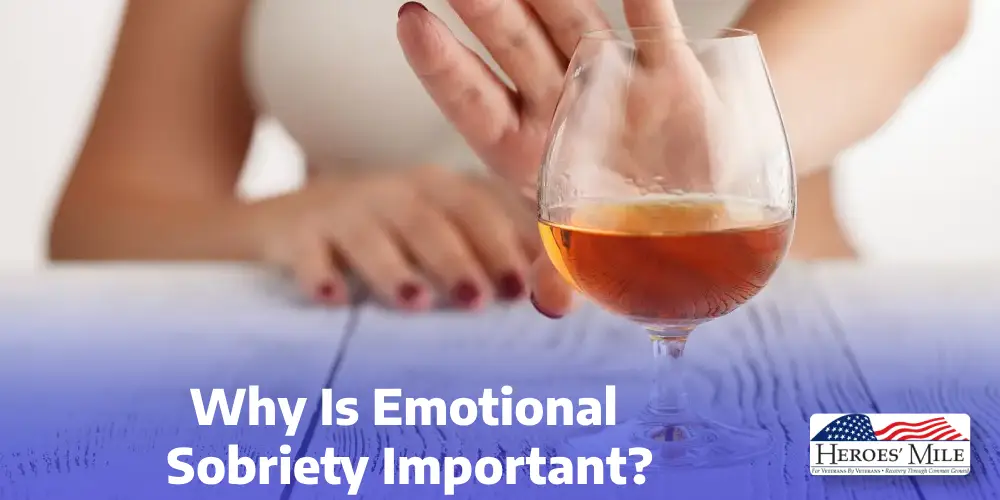The path to recovery from addiction involves more than just hoping to become sober. Remember, turning away from addictive substances is more than just a physical act. When you are working toward recovery, you’ll need to learn how to stay sober throughout the rest of your life as well. In order to do this, you will need emotional sobriety.
What Is Emotional Sobriety?
Emotional sobriety is a lifelong journey. Like normal sobriety, it’s about self-control. In emotional sobriety, you take stock of all your emotions without allowing any one to define your personality or actions. You can achieve emotional sobriety when you have the skills, support, and resources you need to maintain your recovery long after you leave a addiction treatment facility. The reason that you need emotional sobriety, put simply, is because there is a direct connection between your mental health and your addiction. This means that you cannot successfully treat one without addressing the other.
In fact, individuals who have post-traumatic stress disorder (PTSD) or other mental health conditions are at a much greater risk for also developing a substance use disorder.
These statistics show that mental health distress makes it much more challenging to turn away from addictive substances. Individuals frequently turn to drugs or alcohol when they are feeling sad, anxious, or overwhelmed because they do not know how to healthily cope with these emotions. So, even if you take the substance away, often would not know how to handle unexpected stressors.
This is where emotional sobriety becomes instrumental in helping individuals to maintain recovery. If individuals are equipped with the skills they need to manage or regulate these uncomfortable emotions, they will be able to address unexpected or unwelcomed feelings in a healthy, effective way.
Why Is Emotional Sobriety Important?

Why Is Emotional Sobriety Important?
The reality is that we cannot always predict life stressors or unexpected events that could trigger unpleasant emotions. This past year, for example, shows just how little we are able to control, as the COVID-19 pandemic caused devastation around the world. As a result, the frequency of substance abuse as well as overdose deaths have increased significantly. Additionally, more and more people, experienced symptoms of different mental health conditions like anxiety, depression, and even thoughts of suicide.
Though emotional sobriety cannot stop unexpected tragedies from occurring around the world, it can greatly change the way that you respond to life stressors. Your response no longer has to be to turn to drugs or alcohol to numb your pain. This, after all, is not a solution. But with emotional sobriety, you can move past uncomfortable situations to find long-term peace, health, and happiness.
How Do You Achieve Emotional Sobriety?
It’s important to know that emotional sobriety is not something that happens overnight. Emotional sobriety is actually something that you will continue to build and strengthen every single day.
Managing feelings in recovery is one of the greatest challenges in becoming and staying sober. Oftentimes, individuals become newly sober and angry at the same time. Not only does sobriety clear your head and could bring back painful memories, but sobriety also forces you to feel uncomfortable emotions rather than pushing them away.
It is very common to feel anger in early sobriety. This anger could be toward yourself for decisions you made before you entered treatment or this anger could be toward something bigger—something out of your control. You might even feel angry at the prospect of becoming sober. But remember that dealing with sobriety is a physical, emotional, and mental battle.
Your work with emotional sobriety begins the minute you choose to get addiction and mental health treatment. From there, you will work to strengthen your emotional sobriety through the support of mental health professionals and other individuals who truly understand what you are experiencing.
You will work toward emotional sobriety with treatment services such as:
- Safe detox
- Group therapy
- Family therapy
- Recreational and art therapies
- EMDR therapy
Furthermore, through therapies like cognitive behavioral therapy (CBT), you will learn how to better regulate your emotions. You will practice breathing techniques, recognizing emotions, mindfulness, self-acceptance, how to approach crisis situations, and more.
You will also learn practical life skills with nutritional education as well as job readiness training to get you back into civilian life. You will then be able to put these new skills to use as you heal from your past and face your future after rehab.
FAQ
- What is emotional sobriety?
Emotional sobriety refers to the ability to manage emotions in a healthy way without relying on substances. It involves self-awareness, emotional regulation, and resilience in recovery. - Why is emotional sobriety important for long-term recovery?
Achieving emotional sobriety helps prevent relapse by teaching individuals how to handle stress, triggers, and negative emotions without substance use. - How can someone develop emotional sobriety?
Emotional sobriety is built through self-reflection, therapy, mindfulness practices, and support groups like Alcoholics Anonymous (AA) or other recovery programs. - Can you have physical sobriety without emotional sobriety?
Yes, but it can make recovery more difficult. Without emotional sobriety, individuals may struggle with inner turmoil and be at a higher risk of relapse. - What are signs of emotional sobriety?
Signs include emotional resilience, healthy coping skills, self-awareness, improved relationships, and the ability to handle life’s challenges without turning to substances.
